Starbucks announced this week that starting November 7, its US and Canada stores will drop extra charges for plant-based milks — including oat, soy, almond, and coconut — that add 70 to 80 cents to a drink’s cost.
November 3, 2024:
Starbucks announced this week that starting November 7, its US and Canada stores will drop extra charges for plant-based milks — including oat, soy, almond, and coconut — that add 70 to 80 cents to a drink’s cost.
It’s a change that plant-based food advocates have long campaigned for, citing the dairy industry’s grave animal welfare and climate impacts. In 2022, Succession actor James Cromwell — in partnership with PETA — superglued himself to a Starbucks counter in New York City in protest of the upcharge.
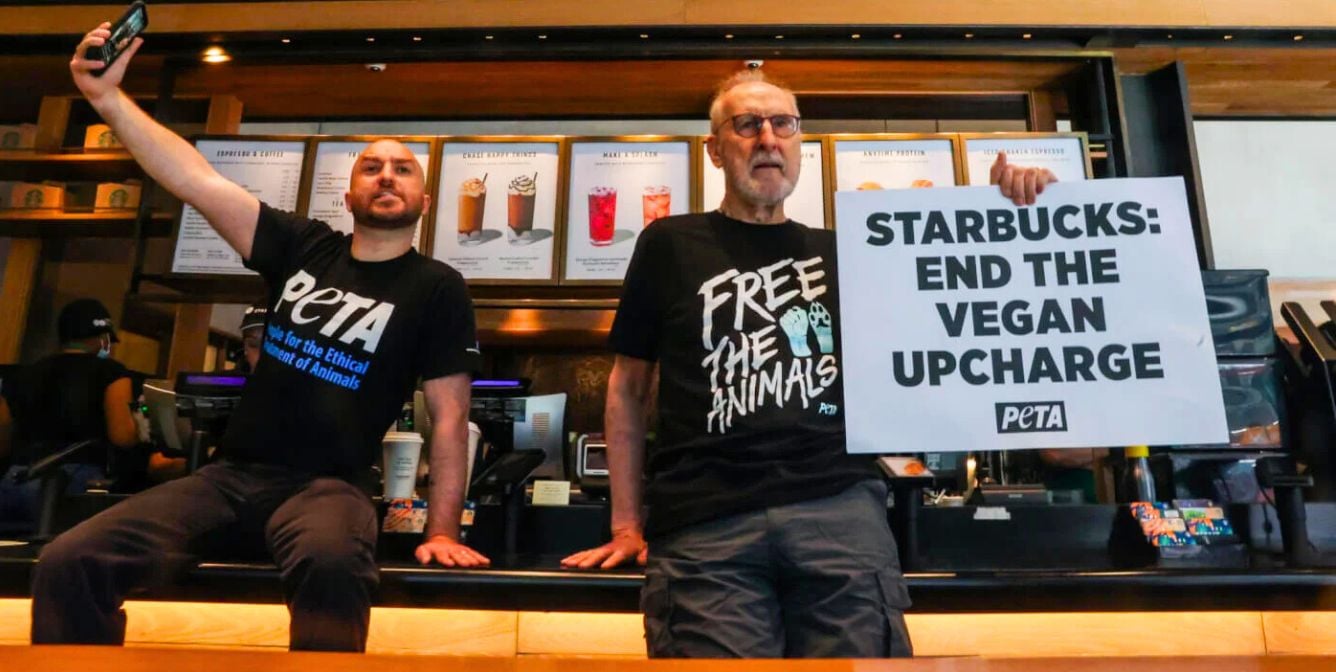
The news comes as the coffee giant tries to win customers back after a marked drop in sales over the last year. Some customers are leaving due to inflation, “balking at $8 lattes, while others are boycotting the chain for a variety of reasons,” according to the New York Times (including the war in Gaza and union busting, though it’s unclear how much impact that’s had on Starbucks’s business). The plant milk fee hasn’t helped. In the US, around one quarter of Starbucks’ drinks that include milk are ordered with plant-based milk, according to data from 2021, and the upcharge adds much more to the cost of a drink for the customer than the actual cost of the plant-based milk to Starbucks.
According to Switch4Good, a nonprofit that advocates for shifting away from dairy and has long agitated against the plant milk surcharge, it costs Starbucks between 9 and 28 cents extra to make a drink with soy, almond, or oat milk. That means the extra 70- to 80-cent charge could amount to a markup of more than 700 percent, depending on the milk alternative. A Starbucks spokesperson told Vox that the decision to drop the surcharge was made to benefit customers but didn’t answer questions about Switch4Good’s analysis.
The company has also been sued for the upcharge on discrimination grounds because around one-third of Americans — disproportionately people of color — have difficulty digesting lactose, a sugar found in milk.
While changing course on the plant milk upcharge was, above all, a business decision, it could also be a milestone in the food industry’s stalled efforts to combat climate change, given milk’s big carbon footprint. The switch will also help to further mainstream dairy-free milk, a more humane and sustainable alternative to conventional dairy, during what has otherwise been a turbulent year for the plant-based food market.
Producing cow’s milk has outsize social and environmental costs compared to plant-based milks — costs that aren’t priced into what consumers pay for dairy, which benefits from a range of government subsidies designed to make animal products cheap and plentiful.
For one, there’s the animal cruelty. The dairy business model depends on artificially inseminating cows and separating them from their calves at birth so humans can take their milk. The calves are typically forced to live alone in small enclosures while dairy cows are kept in large, industrial sheds, spending little to no time in pasture.
After multiple cycles of pregnancy and birth, when a dairy cow’s milk productivity wanes, she’s typically sent to slaughter.
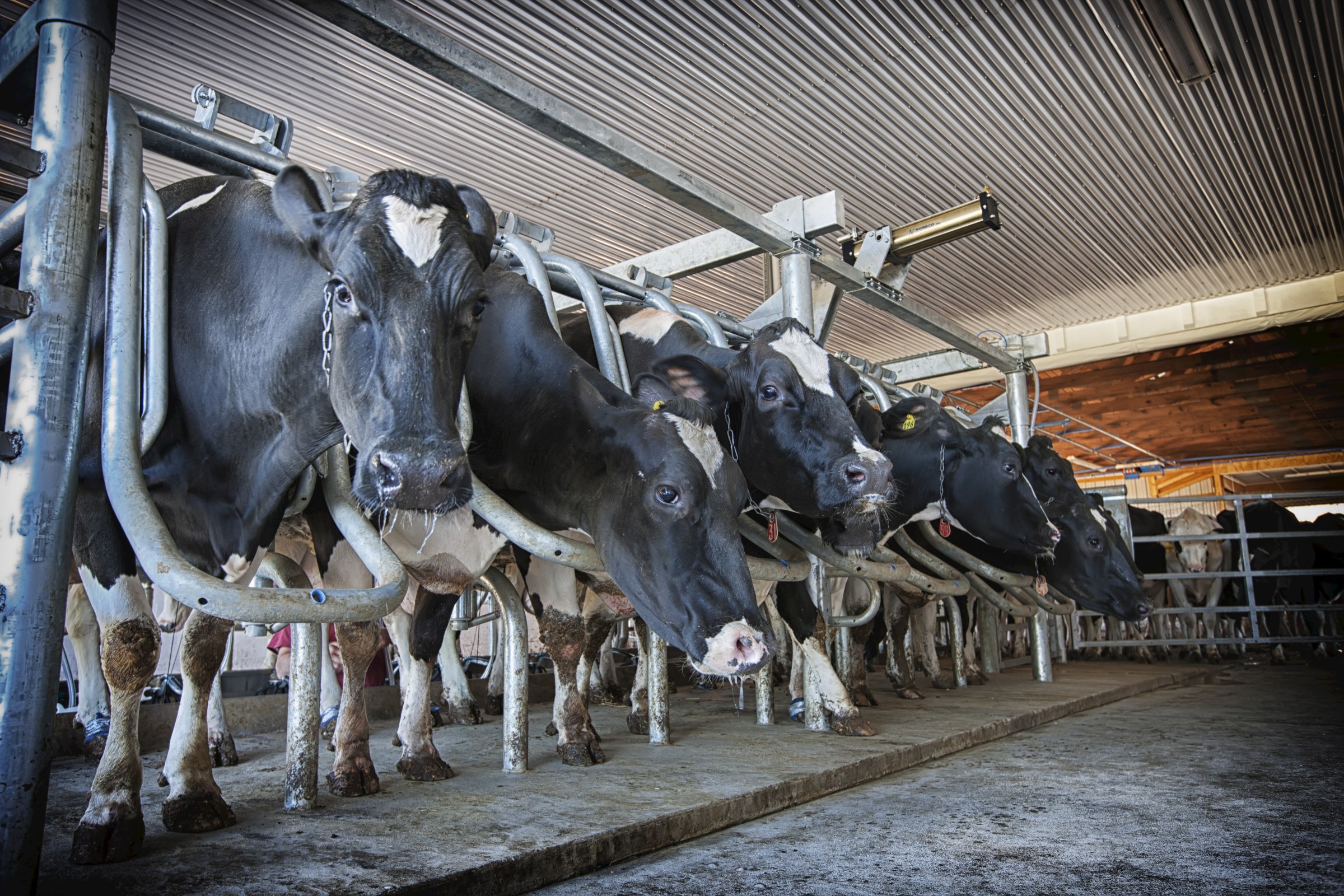
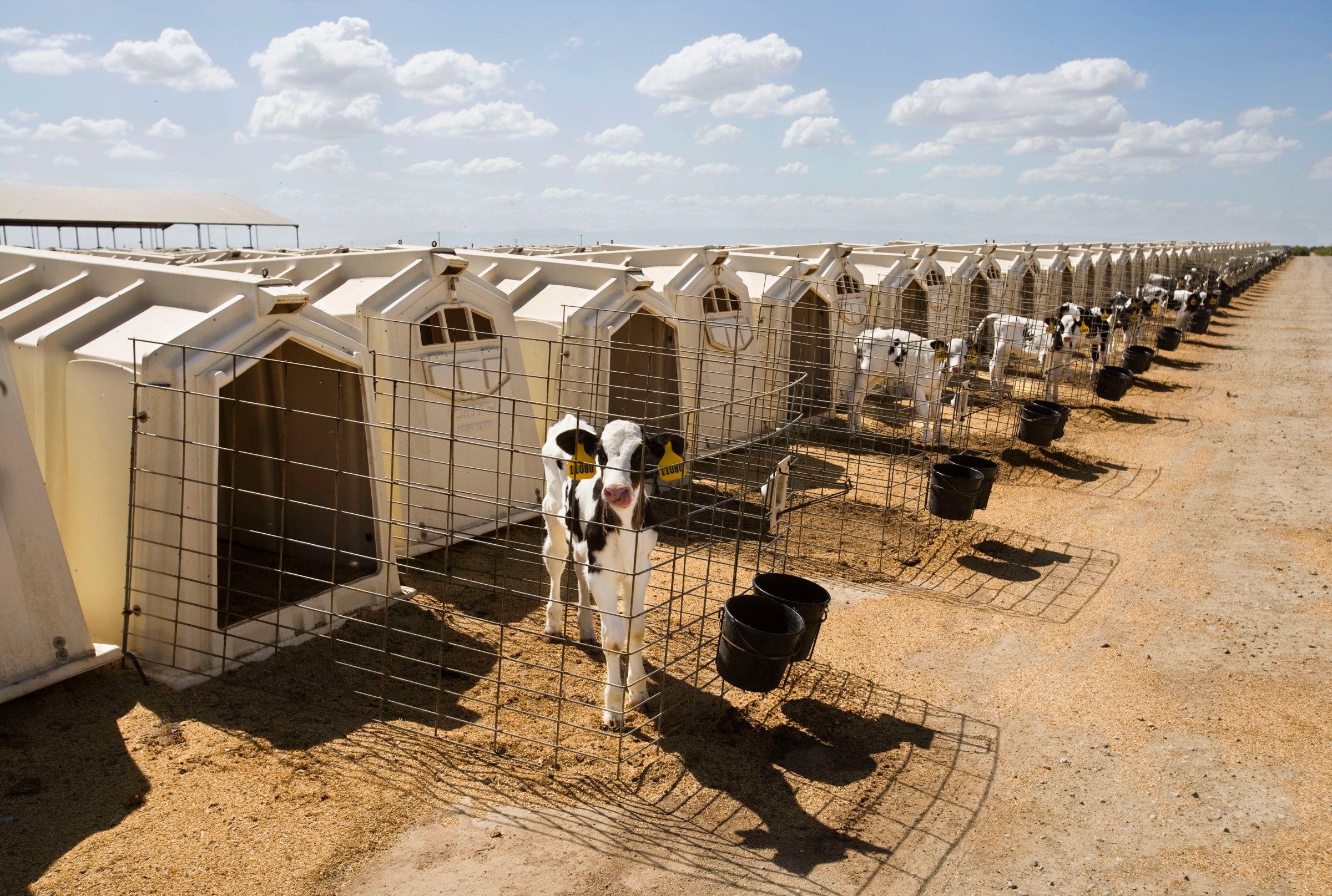
More important to Starbucks, however, is milk’s greenhouse gas emissions, which comprise more than one-fifth of the company’s global carbon footprint. Dairy production devours dramatically more land and water, and contributes far more greenhouse gas emissions and water pollution, than plant-based alternatives. Climate scientists agree that reducing dairy and meat consumption in wealthy countries is a necessary part of climate mitigation.
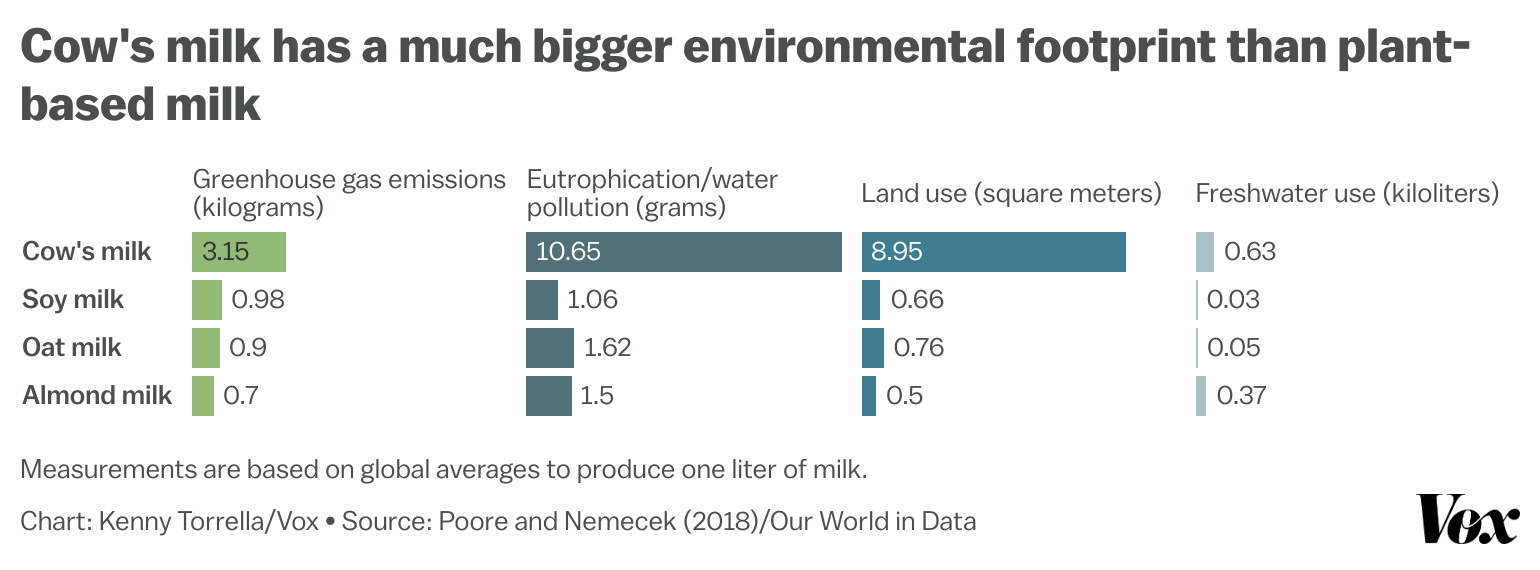
Starbucks has committed to halving its greenhouse gas emissions by 2030, and expanding its plant-based menu options is a key component of that goal. Removing the plant milk upcharge, a Starbucks spokesperson said in a statement, also contributes to the company’s sustainability plans.
As of 2023, the coffee chain had made minimal progress toward reducing its carbon footprint; its overall emissions had increased from its 2019 baseline, in part because its emissions from cow’s milk were up 8 percent over that period. Starbucks is such a large buyer of milk that dairy emissions across its global operations is equivalent to around 2 percent of emissions from all US dairy production.
Food companies are struggling to cut their emissions because most of their menus revolve around meat and dairy, the most carbon-intensive foods. Starbucks’s decision to drop its dairy-free surcharge should help. Substituting nondairy milks is already Starbucks’s second most requested drink customization, according to the company, so the change could push even more of its customers to go dairy-free. It could also push other chains to follow.
The move represents a rare win in recent years for the US plant-based food industry. After a meteoric rise in the late 2010s — as Beyond Meat and Impossible burgers went mainstream and Oatly became the it-milk of baristas and consumers alike — the sector has since faltered. A number of fast food chains have dropped plant-based burgers from their menus, while the incumbent livestock sector has attacked plant-based startups. Shoppers have opted for cheaper animal products amid high inflation.
Plant-based milk, though, has managed to weather the plant-based backlash better than most; from 2021 to 2023, revenues were up 9 percent, accounting for almost 15 percent of total milk sales (though the number of nondairy milk units fell). Meanwhile, plant-based meat sales fell by an estimated 13 percent during that same period.
Given Starbucks’s size and influence, dairy-free milk’s market share may continue to grow — and cow’s milk sales, which have been dropping for decades, may decline further.
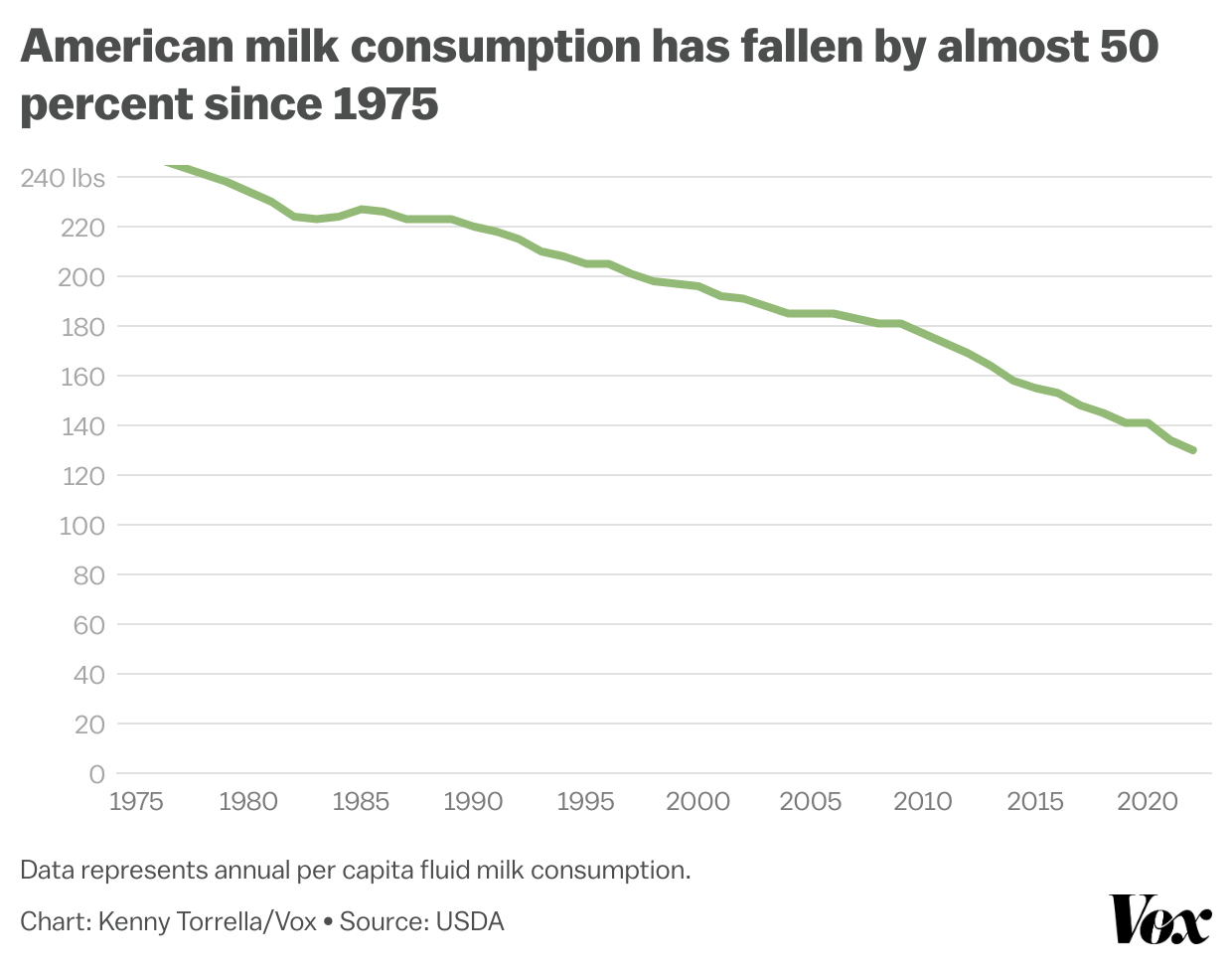
Starbucks’s policy change, however, is more than just a sign of plant-based milk’s staying power; it also demonstrates the potential for the plant-based and anti-factory farming movements to apply sustained pressure to corporations and get results.
PETA and Switch4Good have called on the company to drop the surcharge for years. While Starbucks says the change was a business decision, the protests, celebrity endorsements, and petitions likely helped, creating the very idea that charging more for plant-based options was unjust. And while the protests have at times been ridiculed as the work of whiny vegans angry about a 70-cent charge, the successful campaign will now primarily benefit Starbucks’s millions of nonvegan customers who just enjoy plant-based milks or require them due to lactose intolerance (and, of course, factory-farmed cows and the climate).
“The move follows a vigorous five-year campaign, letters from more than 160,000 PETA supporters, protests at Starbucks around the country, and help from actor James Cromwell… as well as an appeal from Sir Paul McCartney,” a PETA statement reads. PETA paused its campaign in September to give the new Starbucks CEO, Brian Niccol, time to “make the right decision,” the organization said. “And he delivered.”
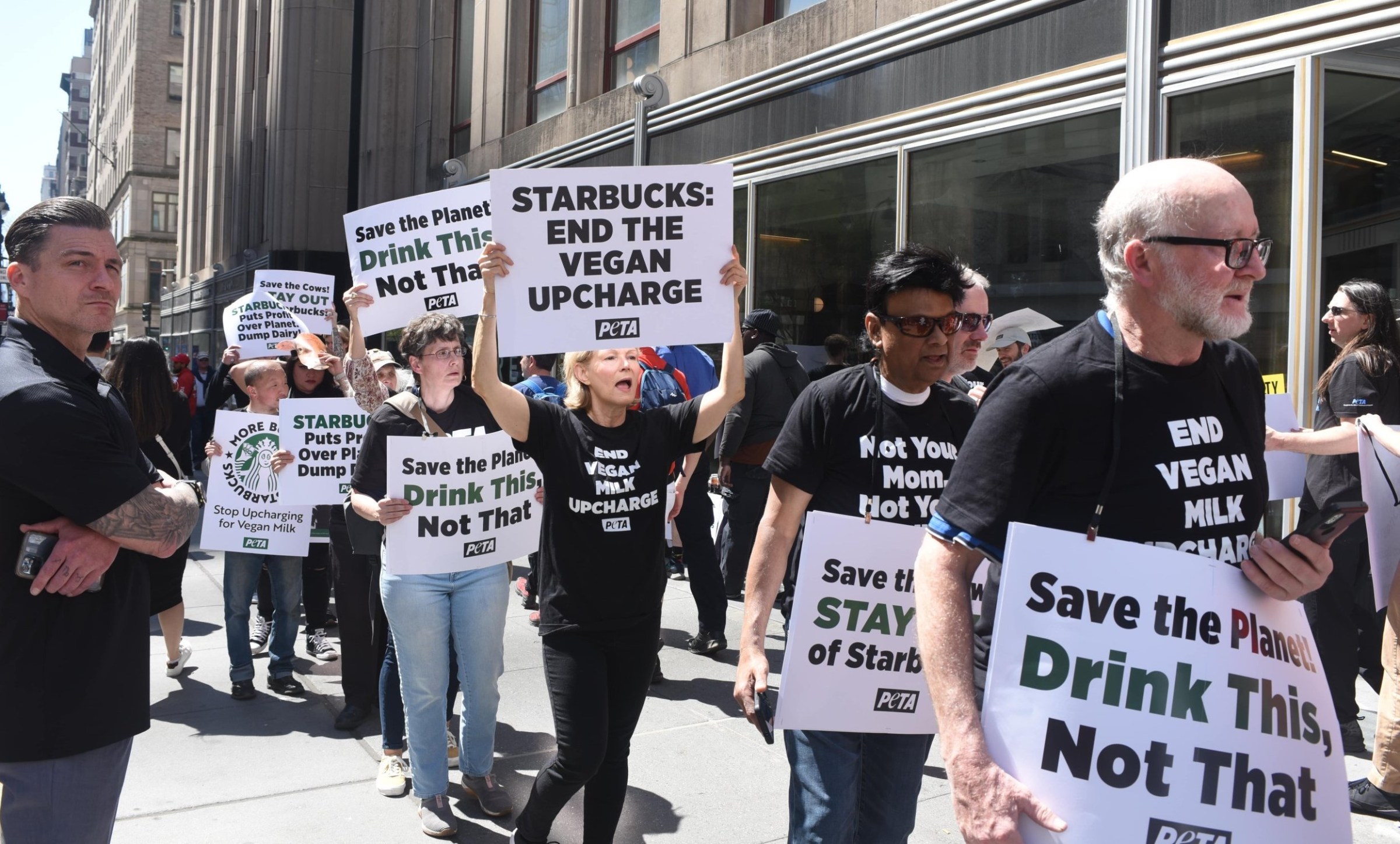
If Starbucks wanted to, it could go even further by making plant-based milk the default option for its milky drinks. In 2022, Blue Bottle, a Nestlé-owned upscale coffee chain with some 100 locations around the world, announced it was making oat milk the default milk in beverage orders in US locations as part of a larger effort to cut carbon emissions. Now, if a Blue Bottle customer wants cow’s milk, they have to request it, but most don’t; a few months after making the switch, Blue Bottle reported that 63 percent of customers were sticking with oat milk.
Blue Bottle’s approach, which other food companies have also embraced, shows how heavily our food choices are influenced by our food environments. Small changes — from dropping surcharges to changing default options — can nudge us toward a more climate-friendly future. Starbucks is the latest, and largest, company to put conventional dairy and plant-based milk on a level playing field. Others should follow.